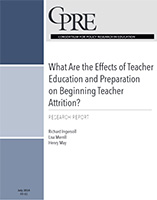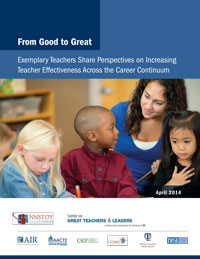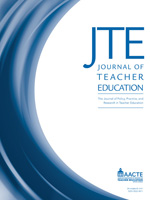04 Nov2014
By Zachary VanHouten and Deborah Koolbeck
As the National Council on Teaching Quality (NCTQ) steps up its document collection by communicating directly with teacher preparation programs’ PK-12 partners, AACTE encourages programs to reach out to their partner schools to raise awareness and build mutual understanding around the requests, including connecting legal counsel from both parties if appropriate.
28 Oct2014
By Tim Finklea and Kristin McCabe
A recent evaluation of the Boston Teacher Residency (BTR) found that program graduates are making a significant impact in Boston Public Schools, providing more racially/ethnically diverse teachers and staying in the classroom at higher rates. A webinar hosted by REL Central earlier this month highlighted the findings and challenges of the evaluation, which was conducted by John Papay and colleagues at Brown University (RI).
The study compared BTR graduates to other novice teachers in the urban school system, asking the following questions:
- Does the BTR program prepare more teachers than other pathways in hard-to-staff subjects such as math and science?
- Are BTR recruits more racially and ethnically diverse than teachers from other pathways?
- Do BTR recruits remain in the district longer than other new hires?
- Are BTR teachers more effective in raising student test scores in math and English language arts than teachers with the same level of experience from other pathways?
16 Oct2014
By Kristin McCabe

Joelle Tutela, President, NJACTE
Teacher quality and professional practice in New Jersey just got an enthusiastic shot in the arm, thanks to a new coalition of the state’s teacher educators, teachers’ unions, and other education groups.
Leaders of this coalition, the Garden State Alliance for Strengthening Education, held a high-profile symposium “Taking Back the Profession” September 27 to release a report chock-full of ideas to improve the continuum of teacher development in the state. The event was attended by several key state education officials and featured nationally known speakers including Stephanie Hirsch of Learning Forward, Marilyn Cochran-Smith of Boston College (MA), and Susan Headden of the Carnegie Foundation for the Advancement of Teaching. In addition, the report was featured at a press conference October 2 and will be the subject of a state hearing later this month.
16 Sep2014
By Jerrica Thurman
AACTE Members Addressing Key Concerns Through Rigorous Programs, Partnerships, and Policy Initiatives
 AACTE member institutions across the country are leading rigorous and effective teacher preparation programs that echo the priorities of those surveyed in the 46th annual PDK/Gallup Poll of the Public’s Attitudes Toward the Public Schools. The 2014 poll includes a special section released today on teacher preparation and evaluation.
AACTE member institutions across the country are leading rigorous and effective teacher preparation programs that echo the priorities of those surveyed in the 46th annual PDK/Gallup Poll of the Public’s Attitudes Toward the Public Schools. The 2014 poll includes a special section released today on teacher preparation and evaluation.
The first report on the 2014 poll, released last month, showed that Americans are skeptical of federal policy influences on public schools and of the Common Core State Standards and standardized tests. The newly released second report delves into specific ways respondents think teacher quality and schools should be improved.
02 Sep2014
By Kristin McCabe
 Preservice preparation in teaching methods and pedagogy has a notably positive effect on new teachers’ likelihood to stay past their first year on the job, according to a new report out of the Consortium for Policy Research in Education (CPRE). Teachers’ routes to licensure, certificate types, degrees, and selectivity of their colleges have much less correlation with attrition, say report authors Richard Ingersoll, Lisa Merrill, and Henry May.
Preservice preparation in teaching methods and pedagogy has a notably positive effect on new teachers’ likelihood to stay past their first year on the job, according to a new report out of the Consortium for Policy Research in Education (CPRE). Teachers’ routes to licensure, certificate types, degrees, and selectivity of their colleges have much less correlation with attrition, say report authors Richard Ingersoll, Lisa Merrill, and Henry May.
Analyzing data from the national Schools and Staffing Survey and supported by a National Science Foundation grant, the authors studied to what degree various elements of preservice preparation contribute to beginning teachers’ attrition or retention after 1 year in the classroom, particularly in the fields of mathematics and science.
22 Aug2014
By Sharon Robinson
Yesterday, U.S. Secretary of Education Arne Duncan issued a statement responding to widespread concerns about standardized testing—saying that “testing issues today are sucking the oxygen out of the room in a lot of schools” and offering to delay by a year the federal requirement that teacher evaluations include some “significant” influence from students’ performance on state assessments.
18 Jun2014
By Sharon Robinson
Yesterday, the National Council on Teacher Quality (NCTQ) released its second annual Teacher Prep Review: A Review of the Nation’s Teacher Preparation Programs. Although parts of this report venture a conciliatory tone, as might be expected from NCTQ’s past reports, this review offers largely unhelpful recommendations that are based on questionable methodology.
Public Shaming—Over a Document Review
In an attempt to provide a consumer-friendly guide to teacher preparation programs, NCTQ has moved from rating institutions on a 4-star scale to ranking them numerically—a divisive tactic that mostly serves to pit institutions against one another. Notably, these rankings have as little to do with graduates’ readiness to teach as did last year’s star system.
11 Jun2014
By Julie Underwood
American teachers touch the American future every day. They do so by producing good citizens, good employers, good workers, and good people. As teacher educators, we prepare these leaders.
In today’s political climate, too many people take a simplistic approach to teaching and learning. It’s not hard to find someone who will argue that to teach, all you need are good intentions. Nearly everyone has been in school, so many people believe this makes them expert on how to teach and even on how to train teachers. Similar logic would lead us to conclude that since everyone has been born, we could all be obstetricians and medical educators. Teaching and teacher training are not simple tasks.
10 Jun2014
By Elizabeth Ross
The Innovations Inventory of AACTE’s Innovation Exchange is an online database highlighting members’ pioneering practices in educator preparation that have shown a positive impact on issues of student learning, preparation program advancement, or educator workforce needs. This blog post is one in a series highlighting entries from the inventory. To request inclusion of your institution’s innovations, contact Zachary VanHouten at zvanhouten@aacte.org.
 Georgia State University (GSU) is the largest producer of minority educators in the state of Georgia and graduates approximately 500 teachers annually. GSU’s Network for Enhancing Teacher Quality (NET-Q) program aims to increase teacher quality in urban and rural areas in Georgia. The program includes both pre- and postbaccalaureate initiatives for educators serving high-need school districts in these settings.
Georgia State University (GSU) is the largest producer of minority educators in the state of Georgia and graduates approximately 500 teachers annually. GSU’s Network for Enhancing Teacher Quality (NET-Q) program aims to increase teacher quality in urban and rural areas in Georgia. The program includes both pre- and postbaccalaureate initiatives for educators serving high-need school districts in these settings.
NET-Q boasts a partnership with at least 15 rural PK-12 schools, local businesses, two historically Black colleges, and the National Commission on Teaching and America’s Future.
02 May2014
By Mary Harrill
 AACTE applauds the Council of Chief State School Officers’ 2014 National Teacher of the Year Sean McComb, the three additional finalists, and the colleges of education that helped prepare all of them for their highly successful careers.
AACTE applauds the Council of Chief State School Officers’ 2014 National Teacher of the Year Sean McComb, the three additional finalists, and the colleges of education that helped prepare all of them for their highly successful careers.
McComb, who is also the 2014 Maryland Teacher of the Year, teaches English at Patapsco High School & Center for the Arts in Baltimore. Additionally, he oversees the school’s Advancement via Individual Determination (AVID) program. He completed his undergraduate and graduate preparation at the University of Pittsburgh, earning a bachelor’s degree English literature and master’s degree in English education.
01 May2014
By Jessica Milton
 How does the profession support teachers’ development over time? Addressing that question from a collaborative approach, a new report was released yesterday by the National Network of State Teachers of the Year in partnership with the Center on Great Teachers and Leaders at American Institutes for Research and five other national education organizations, including AACTE. The Council of Chief State School Officers hosted a release event featuring a panel discussion by teacher leaders, researchers, and policy makers about the report’s findings.
How does the profession support teachers’ development over time? Addressing that question from a collaborative approach, a new report was released yesterday by the National Network of State Teachers of the Year in partnership with the Center on Great Teachers and Leaders at American Institutes for Research and five other national education organizations, including AACTE. The Council of Chief State School Officers hosted a release event featuring a panel discussion by teacher leaders, researchers, and policy makers about the report’s findings.
Insights in the report, From Good to Great: Exemplary Teachers Share Perspectives on Increasing Teacher Effectiveness Across the Career Continuum, are based on an exploratory survey of more than 300 former national and state teachers of the year. This research identifies valuable professional experiences and supports that were essential to these exemplar teachers’ professional growth and effectiveness throughout various stages of their career. Teachers responded to survey questions relevant to four stages of the teacher career continuum, identified as the preservice, novice, career, and teacher leader stages.
17 Apr2014
By Jane E. West
Tomorrow, April 18, is the deadline for public comment on the proposed “highly qualified teacher” (HQT) data collection by the U.S. Department of Education. A detailed letter submitted yesterday by the Coalition for Teaching Quality hails the proposed collection as “an important first step towards meeting the legislative intent” of Congress’ directive to report on the extent to which students in certain high-need categories are taught by teachers who are labeled as “highly qualified,” but who are actually teachers-in-training in alternative routes.
04 Feb2014
By Kristin McCabe
 The March/April 2014 issue of the Journal of Teacher Education (JTE) is now available online. See what Volume 65 Number 2 has to offer!
The March/April 2014 issue of the Journal of Teacher Education (JTE) is now available online. See what Volume 65 Number 2 has to offer!
- In this month’s editorial, “Research as a Catalyst for Change,” JTE‘s editors at Penn State University relate the issue’s contents to AACTE’s 66th Annual Meeting theme, Taking Charge of Change. Heralding the theme as an opportunity to champion the role of research in informing policy and practice, the editors highlight the articles’ contributions to knowledge about innovative practices in the development of both preservice and in-service educators.
30 Jan2014
By Sarah Pinsky
Today, AACTE released model state legislation to recruit high-achieving students into the teaching profession and incentivize them to teach in our neediest schools.
The Teaching Fellows bill is the first released by AACTE in its initiative to develop model state legislation that is aligned with AACTE’s state policy priorities and with the recommendations from “Excellent Teachers for Each and Every Child: A Guide for State Policy,” a joint effort by AACTE and several partner organizations that was released in December 2013. The initiative reflects AACTE’s goal of promoting sound education policies—grounded in research and practice—that will strengthen the teaching profession and will have a positive impact on students.
28 Jan2014
By Aimee Hall
This post also appears on the AACTE Annual Meeting site.
AACTE and TeachingWorks are collaborating on a strand of sessions at the 66th Annual Meeting that will examine the challenges of preparing novice teachers for practice and explore potential solutions. This strand will provide a forum for sharing ideas and learning from programs that are taking on the challenges of building practice-based teacher education. It will also address implications of the Common Core State Standards for teacher preparation.








 AACTE member institutions across the country are leading rigorous and effective teacher preparation programs that echo the priorities of those surveyed in the
AACTE member institutions across the country are leading rigorous and effective teacher preparation programs that echo the priorities of those surveyed in the  Preservice preparation in teaching methods and pedagogy has a notably positive effect on new teachers’ likelihood to stay past their first year on the job, according to a
Preservice preparation in teaching methods and pedagogy has a notably positive effect on new teachers’ likelihood to stay past their first year on the job, according to a  Georgia State University (GSU) is the largest producer of minority educators in the state of Georgia and graduates approximately 500 teachers annually. GSU’s
Georgia State University (GSU) is the largest producer of minority educators in the state of Georgia and graduates approximately 500 teachers annually. GSU’s  AACTE applauds the Council of Chief State School Officers’ 2014 National Teacher of the Year
AACTE applauds the Council of Chief State School Officers’ 2014 National Teacher of the Year  How does the profession support teachers’ development over time? Addressing that question from a collaborative approach, a new report was
How does the profession support teachers’ development over time? Addressing that question from a collaborative approach, a new report was  The March/April 2014 issue of the Journal of Teacher Education (JTE) is now available online. See what
The March/April 2014 issue of the Journal of Teacher Education (JTE) is now available online. See what